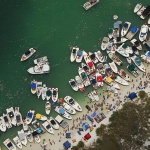Naples, Florida is known worldwide for its stunning beaches and the quality of the seawater is an essential part in enjoying a safe and hazard-free swim. Good thing the Florida Department of Health works to keep residents and visitors safe from any water pollutants while swimming out in the sea by conducting routine checks and if a test comes back with bad qualities two times in a row, the government will put up signs along the beach cautioning the people to stay out of the water until further notice. This is done for everyone’s safety.
The Florida Health Department understands that as the temperature rises during the day in the state, so does the inclination of people, particularly families to go and spend an afternoon on one of the amazing Florida beaches. So, the department has brought to us a few safety tips for a more fun and sunny days in Naples, Florida.
Follow these simple steps for a healthy and safe swimming experience whether in the sea or in the pool:
- Use a high SPF sunscreen to protect yourself and your family from harmful UV rays that cause sunburn and skin cancer and reapply after swimming;
- Wear insect repellent to prevent mosquito bites and the spread of mosquito-borne illnesses;
- Shower with soap before you get in the water;
- Limit the amount of water going up your nose when swimming can help prevent infection from the ameba named Naegleria fowleri. This amoeba causes a rare infection of the brain termed amebic meningoencephalitis, that is often fatal.
- Don’t swallow the water you swim in;
- Stay out of the water if you have diarrhea, don’t swim until you are diarrhea-free for two weeks;
- Parents should take children on bathroom breaks every 60 minutes;
- Avoid contact with algae blooms;
- Wash your hands after visiting the bathroom or changing diapers; and
- Visit your local hardware or pool-supply store and purchase pool test strips to check the chlorine and pH levels before getting into the water.
In addition to being aware of water quality, Floridians can take simple precautions to prevent injury or drowning and the latter can be a very quiet event so it always pays to be vigilant. By incorporating what the department calls “layers of protection”, including supervision, barriers and emergency preparedness, knowing what to do in case of an accident can help families and vacationers swim safely and securely.
Knowing how to do CPR or how to rescue someone who’s drowning can go a long way. We also have to make sure to follow what the lifeguard says at all times and respect the barriers that are set up along the coastline or the perimeter as they keep people out, especially children out of danger zones.
Swimming is a fun way to spend time in southwest Florida. No trip on Naples, Marco Island or the Everglades is complete without it. By following simple but important steps, locals and visitors can ensure that the time with loved ones won’t be interrupted by injury or illness.









